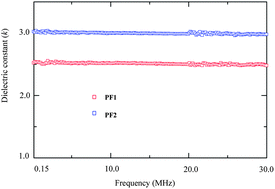A new low dielectric material with high thermostability based on a thermosetting trifluoromethyl substituted aromatic molecule
Abstract
A thermally cross-linkable molecule composed of bis(trifluoromethyl)benzene and benzocyclobutene units (F1) was successfully prepared. Heating F1 (>200 °C) gave a cured resin, which showed a dielectric constant (k) of 2.47 at 30 MHz and an average k value of less than 2.51 in a range of frequencies from 0.15 MHz to 30 MHz. Such low k values are comparable to other polymeric low-k materials. For comparison, a perfluorobenzene with benzocyclobutene groups (F2) was also synthesized. The cured F2 exhibited an average k value of 2.98, indicating that the introduction of a trifluoromethyl group into the backbone of the molecules can efficiently decrease the dielectric constant of the molecules. The cured F1 also exhibited high thermostability (T5 = 429 °C, weight residual = 47.7% at 1000 °C under N2). These results suggest that F1 is suitable for the utilization in ultra large scale integration circuits.


 Please wait while we load your content...
Please wait while we load your content...